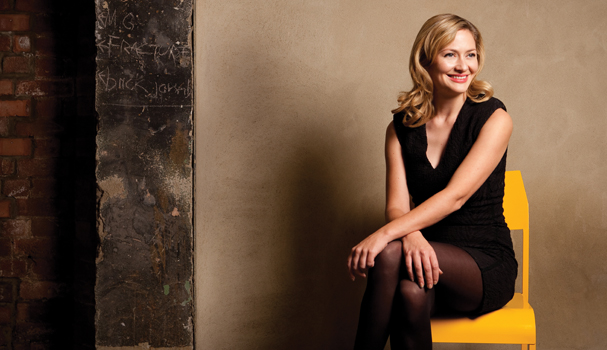Women in technology is a hot topic. Alongside hackneyed comparisons between London and Silicon Valley, it’s a business magazine staple, a familiar item on news bulletins. And since the publication of Facebook COO Sheryl Sandberg’s crowd- pleasing book Lean In last year, there has been much more focus on getting girls interested in studying STEM subjects and persuading more young women that technology is an exciting and rewarding career.
But while the grassroots work may have begun, there are still comparatively few women running substantive tech start-ups in the UK. “Hopefully this will change and there will be more female stars of the technology scene starting really big businesses,” says Kathryn Parsons, co-founder of Decoded, which teaches digital skills, including how to code. “I want a woman to be at the helm of the next £1bn business. Me,” she laughs.
It isn’t a total surprise that Parsons has ended up running a technology company: a cursory glance at her childhood bookshelf may well have given the game away. “There were all these books on the languages I’m obsessed with – Mandarin, Japanese, French – as well as maps and my dad’s business books that I was reading from the age of eight. Fast forward 20 years and I’ve got a business that is dedicated to demystifying the dark art of a language.”
Parsons was a bright, studious child, shunning teenage high-jinks for afternoons reading in the library. “I was quite academic so I was a bit geeky in that sense. I would spend my holidays in the UCL library and was obsessed with poetry, English, meaning, culture, Latin… I wasn’t very wild – I probably left that until my university years,” she says.
Already harbouring ambitions to start her own business, Parsons had written several business plans before she went off to Cambridge to read classics. “I was going to do Japanese, but I’d enrolled myself in night classes at SOAS from the age of 14 and I felt like I’d already done a degree in it,” she explains. “And I’ve always loved Latin and ancient Greek. For me they were puzzles: it was looking at information and trying to piece it together and make sense of it and find patterns. I loved it.”
Although she studied hard, Parsons also became more social at university, partying with her peers and becoming more skilled at forging relationships. “It was the first time I’d been surrounded by incredibly ambitious and competitive people and I think it’s really easy to get lost in that environment. For a lot of people, their ambitions were to become a lawyer or a doctor or a consultant, so it was quite an interesting time finding the more creative entrepreneurial minds within it. For me, it was all about hanging out with the classicists and the mavericks and the people who liked arranging parties.”

Although her time at university had not altered her ultimate goal of setting up a business, Parsons learned valuable life skills. “Exposing yourself to a really diverse group of people you’ve never met before and building connections and networks is super valuable. I definitely wasn’t outgoing or sociable before university and the thought of going and setting up a business without those really fundamental skills would have been a disaster, frankly.”
While her entrepreneurial ambitions had not waned, Parsons realised she needed to earn her stripes in the business world and joined the highly acclaimed graduate training scheme at Ogilvy, the advertising agency. “I just wanted to learn about business. I also met some incredible people including my future business partner Richard [Peters], who is also part of the Decoded team,” she explains. Parsons and Peters were tasked with becoming the advertising company’s crack team of innovators, moving around its stable of agencies helping them to create viral, digital content and putting technology at its heart.
“It was an incredible learning process but I was buzzing away in the background thinking about how badly I wanted to start my own business,” says Parsons. She and Peters decided to go it alone and set up their own creative agency, The Scarlett Mark, whose first client was MTV. “We had this brilliant opportunity to pitch for a global MTV project, which was about how could you create something that would make people much more green and treat the world around them better,” she recalls.
Parsons’ answer to the brief was ‘Cherry Girl’, a character living in a virtual world who would leave behind her a trail of “positive construction rather than destruction”. All over the world, people fell in love with Cherry Girl, from London to Brazil. As the owners of the IP, Parsons and Peters also commercialised the project through licencing deals, flogging headphones and bags.
Ever the accomplished networker, Parsons decided to set up a meeting with Steve Henry, who had written a few flattering pieces about The Scarlett Mark. “I thought I should say thank you and take him for a drink, so I took him to Shoreditch House. But he doesn’t drink and I thought, ‘God, this is going to last 20 minutes,’” laughs Parsons.
While they may not have shared a bottle of Sancerre, what they did share was a passion for how technology and digital is changing the world. “We had a very interesting conversation that then became the conversation between the four of us,” explains Parsons, referring to Decoded’s other two co-founders, Alasdair Blackwell and Richard Peters.

“There I was creating virtual worlds and was a lover of languages, yet when challenged by Steve on ‘do you know how to code?’ and ‘do you understand the languages behind the screen?’, I’d say ‘no, someone else does that’. But that’s really disempowering. The world around us is digital. Anyone and everyone should be able to understand technologies behind the screen. But most don’t understand it. In fact, 95% of the world probably don’t understand it,” explains Parsons.
The assembled co-founders set themselves a challenge: “Could we take someone at zero and get them to a point where they feel so confident, so empowered, that they understand exactly what’s going on behind the screen so well they can actually code their own app from scratch?”
Parsons immediately stopped working on The Scarlett Mark and started focusing all her energy and resources on Decoded. “There was a moment when a switch flicked and I just stopped working on my business,” she says.
But not everyone shared her enthusiasm. “I told a taxi driver about my new business and he said, ‘That’s amazing.’ Then I realised he thought I’d said I teach people how to make coats and he really wanted to learn how to make a coat,” she laughs. And he wasn’t the only doubter. “I remember my mum saying to me, it still makes me really sad when I think about it today, ‘Kathryn, you’re going to have to decide when you’re going to stop this and go and get a real job.’ I had wanted to set up a business for so long, for so many years but just hadn’t quite cracked it. It was so heartbreaking.”
It’s fair to say that Parsons et al have proved the naysayers wrong. Since setting up the business in 2011, more than 8,000 professionals have attended Decoded’s sessions, including blue chip organisations such as Talk Talk, Thomas Cook and McKinsey. On the day of our interview and photo shoot, there are bigwigs from banks UBS and Lloyds in the workshop space being put through their paces. Coding isn’t just for the nerds, it seems. Everyone from the HR director to the chairman in businesses small and large can benefit from better understanding the digital agenda.
The appetite for Decoded’s wares stretches beyond the UK: Decoded recently opened a New York office and has 30 pop-up locations around the world in cities including Shanghai, Hong Kong, Sydney and LA.

Since the flagship ‘code in a day’ product launched, data visualisation and future technologies have been added to the portfolio of products. And there’s more on the horizon as Decoded takes coding to the masses. “We’re doing something quite radical in September, which is going to be very exciting: we’re open sourcing and making freely available our code education materials and all our coding platform for anyone to teach code to their kids or in a classroom. For free,” adds Parsons.
This isn’t Decoded’s first foray into education. More than 500 teachers have passed through its doors but this is the first time the materials will be made available online.
Learning is a hot topic for Parsons. And not just because her company is in the business of teaching. “I love conferences. They are just the most amazing things,” she enthuses. “They are just brilliant for opening your mind.” In fact, a conference in Amsterdam was where she first met her partner Michael Acton Smith, the Mind Candy founder and former EB cover star.
So what’s it like inside the relationship of the UK’s hottest start-up couple? “We’re both fascinated about how everything works, we want to understand different business models and we both love technology so we can geek out on that together,” jokes Parsons.
But Acton Smith is by no means her only port of call for business advice. She has many friends who own and run big businesses including Moo.com founder Richard Moross. She’s happy to take the words of wisdom from Decoded clients, too – whether on the subject of good corporate governance or the company’s recent expansion across the pond. “I spend a lot of time talking to founders of different businesses but people on the boards of PLCs will also have a fascinating perspective on something like what makes a perfect board structure,” she says.
“I just like learning from other people. I’ve never launched a business in New York before. You’ve got to learn from someone.” ![]()
Share via:








































